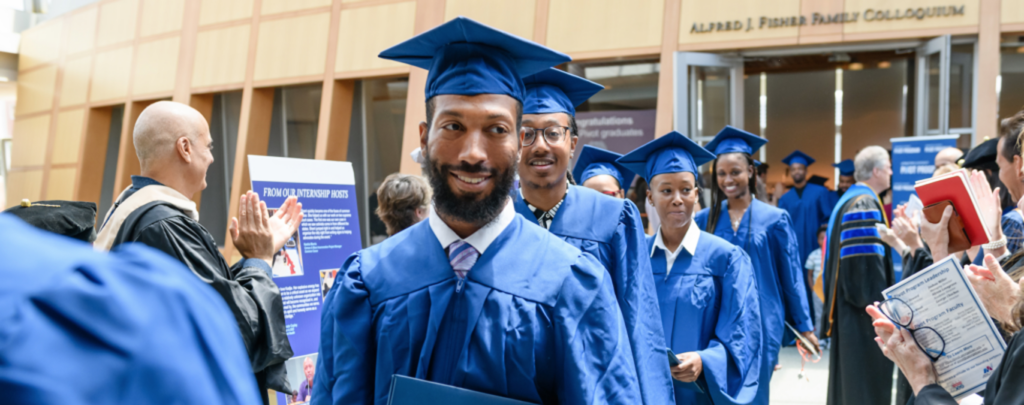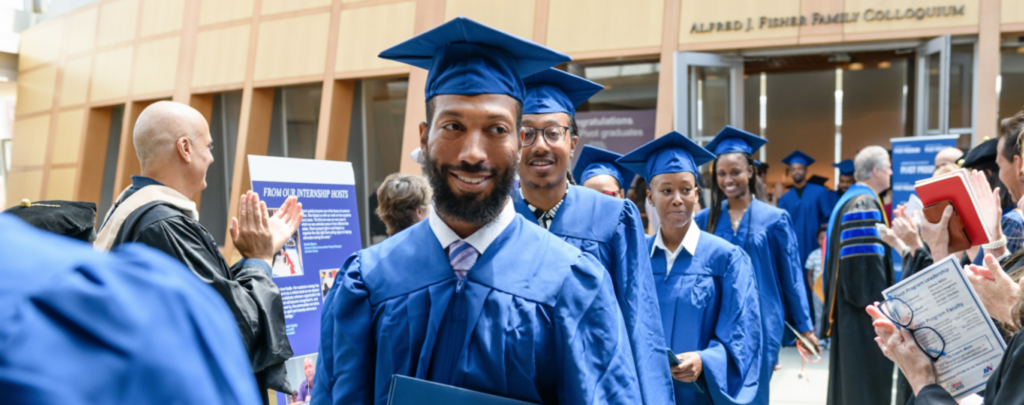The Georgetown University Pivot Program released its first ever annual report, showcasing the work of the program since its founding three years ago.
The Pivot Program hosts annual cohorts for around 15 formerly incarcerated students from the Washington, D.C. area to earn a certificate in business and entrepreneurship. The program is hosted under the McDonough School of Business (MSB) and the Prisons and Justice Initiative (PJI), featuring courses taught by Georgetown faculty.

The Pivot Program provides invaluable experiences to its participants, according to Pascal Laporte, a member of the Pivot Program who graduated in 2021.
“It’s good to know that there is a legacy and that we can create alumni from this program,” Laporte said in a phone interview with The Hoya. “I got the opportunity to get more education, guidance and mentorship. It’s good to know that there is a community of people out there fighting to provide that in a carceral setting and outside upon release.”
The report highlighted the staggeringly high incarceration rates in the United States, with more than 7 million Americans currently under the control of the correctional system. In Washington, D.C., 5,000 people are released from prison or jail each year, with many struggling to find long-lasting and fulfilling employment, according to the report.
The report shows a cohesive picture of the work the Pivot Program has done over the past year, according to Marc Howard, the director of Georgetown’s Prisons and Justice Initiative.
“It really hits the marks on all fronts, whether it’s celebrating the fellows that just graduated, or promoting the program to future applicants and fellows,” Howard said in a phone interview with The Hoya. “We are really contributing to a narrative shift in the value of formerly incarcerated people and their potential to the business community and as entrepreneurs.”
The Pivot Program aims to use education to combat the lack of opportunities that formerly incarcerated individuals face during reentry to society, according to Paul Almeida, dean of the MSB.
“The faculty and staff who lead the program are as committed to changing the narrative around second-chance hiring as they are to helping our fellows, one-on-one, to bring about change in their own lives,” Almeida wrote in an email to The Hoya.
Fellows in the program are taught entrepreneurial skills and strategy and are encouraged to pursue employment opportunities, with further courses on topics including liberal arts, critical thinking and professional life skills.
David Schultz, another Pivot Program graduate who will have the opportunity to return and teach future students, said the Pivot Program was a life-changing experience.
“To be able to come back as an employed individual to assist in the facilitating of the class we teach is truly a full circle moment for me,” Schultz wrote in an email to The Hoya. “The fact that this institution of higher learning has taken the time to build a curriculum to help returning citizens succeed and make a positive impact on society is something that I hope other schools and businesses replicat in the future. It has definitely changed my life.”
The 2020 cohort attended an in-person graduation ceremony in June 2021 after staff postponed it because of the COVID-19 pandemic, the report reads. The event provided a space for graduates to celebrate completing the program, according to Howard.
“It was inspiring to all be together to celebrate a successful year of having overcome not just the circumstances of returning citizens, which is already a challenge, but also through a pandemic, through a virtual year,” Howard said. “Many people when they are incarcerated, especially for a long period of time, really lose touch with technology, so the burden is very high to adjust to essentially foreign forms of communication.”
The Pivot Program creates a support system for formerly incarcerated individuals focused on their futures rather than their pasts, according to Schultz.
“One thing that is really special is being put in a network of successful individuals who can help you do nothing but succeed,” Schultz wrote. “It was also amazing to be in a ‘safe space’ where we were not judged by our mistakes but looked at as a human being just wanting to do great things in life.”





















